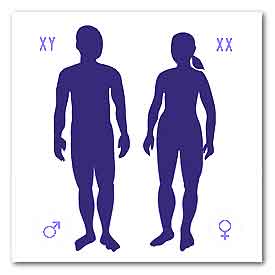|
Are you male or female? The answer to this seemingly
simple question can have a major impact on your
health. While both sexes are similar in many ways,
researchers have found that sex and social factors
can make a difference when it comes to your risk for
disease, how well you respond to medications, and
how often you seek medical care. That’s why
scientists are taking a closer look at the links
between sex, gender, and health.

Many people use the words sex and gender
interchangeably, but they’re distinct concepts to
scientists.
Sex is based on your genetic makeup. Males have one
X and one Y chromosome in every cell of the body.
Females have two X chromosomes in every cell. These
cells make up all your tissues and organs, including
your skin, heart, stomach, muscles, and brain.
Gender is a complex element, biological, social and
cultural, conditioned by the hormonal system, which
in turn is influenced by the environment and
chemicals who daily interact with the body.
“Sex and gender play a role in how health and
disease affect individuals. There was a time when we
studied men and applied those findings to women, but
we’ve learned that there are distinct biological
differences between women and men,” explains Dr.
Janine Austin Clayton, who heads research on women’s
health at NIH. “Women and men have different
hormones, different organs, and different cultural
influences—all of which can lead to differences in
health.”
As scientists learn more about the biology of males
and females, they’re uncovering the influences of
both sex and gender in many areas of health.
For instance, women and men can have different
symptoms during a heart attack. For both men and
women, the most common heart attack symptom is chest
pain or discomfort. But women are more likely than
men to have shortness of breath, nausea and
vomiting, fatigue, and pain in the back, shoulders,
and jaw. Knowing about such differences can lead to
better diagnoses and outcomes.
Men and women also tend to have different responses
to pain. NIH-funded researchers recently learned
that different cells in male and female mice drive
pain processing.
“Without studying both sexes, we wouldn’t know if
we’re taking steps in the right direction toward
appropriate clinical treatment for men and women,”
Clayton says. “Our differences also affect how we
respond to medications, as well as which diseases
and conditions we may be prone to and how those
diseases progress in our bodies.” For example, women
metabolize nicotine faster than men, so nicotine
replacement therapies can be less effective in
women.
Scientists are finding that addiction to nicotine
and other drugs is influenced by sex as well. “When
it comes to addiction, differences in sex and gender
can be found across the board,” says Dr. Sherry
McKee, lead researcher at an NIH-funded center at
Yale University that studies treatments for tobacco
dependence. “There are different reasons men and
women pick up a drug and keep using a drug, and in
how they respond to treatment and experience
relapse.
Sex also influences disease risk in addiction. For
example, women who smoke are more susceptible to
lung and heart disease than men who smoke.”
One NIH-funded research team has detected some of
these differences in the brain. In a recent study,
16 people who smoke—8 men and 8 women—underwent
brain scans while smoking to create “movies” of how
smoking affects dopamine, the chemical messenger
that triggers feelings of pleasure in the brain.
These brain movies showed that smoking alters
dopamine in the brain at different rates and in
different locations in males and females. Dopamine
release in nicotine-dependent men occurred quickly
in a brain area that reinforces the effect of
nicotine and other drugs.
Women also had a rapid response, but in a different
brain region—the part associated with habit
formation. “We were able to pinpoint a different
brain response between male and female smokers, a
finding that could be useful in developing
sex-specific treatments to help smokers quit,” says
lead study researcher Dr. Kelly Cosgrove, a
brain-imaging expert at Yale University.
Scientists have found sex influences in autoimmune
disorders as well. About 80% of those affected are
women. But autoimmune conditions in men are often
more severe. For instance, more women than men get
multiple sclerosis (MS), a disease in which the
body’s immune system attacks the brain and spinal
cord. But men seem more likely to get a progressive
form of MS that gradually worsens and is more
challenging to treat.
“Not only are women more susceptible to MS, but
women also have many more considerations in the
management of the disease, especially since it often
begins during child-bearing years,” says Dr. Ellen
Mowry, a specialist who studies MS at Johns Hopkins
University.
For more information
Different immune cells mediate mechanical pain
hypersensitivity in male and female mice. Sorge RE,
Mapplebeck JC, Rosen S, et al. Nat Neurosci. 2015
Aug;18(8):1081-3. doi: 10.1038/nn.4053. Epub 2015
Jun 29. PMID: 26120961.
Link...
Sex differences in the brain's dopamine signature of
cigarette smoking. Cosgrove, KP, Wang S, Kim S-J, et
al. J Neurosci. 2014 Dec 10;34(50):16851-5. doi:
10.1523/JNEUROSCI.3661-14.2014. PMID: 25505336.
Link...
U.S. National Institutes of Health
Link...
MDN |